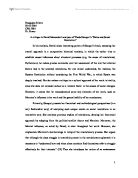Primarily, Skocpol presents her theoretical and methodological perspectives (in a very fashionable way) of analyzing such unique events as social revolutions in an innovative way. She analyzes previous studies of revolutions, drawing her theoretical approach by adapting from the political-conflict theory and Marxism. Moreover, the Marxist influence, as noted by David, is clear throughout her work. However, she emphasizes Marxism’s shortcomings to interpret the revolutionary process. She argues that although the class struggle is invariably present in the revolutionary upheavals it is necessary to “understand how and when class members find themselves able to struggle effectively for their interests.” (13) Then she introduces her notion of an autonomous state, which would be self interested and that it participated actively, more or less in each case, in the revolutionary process. What I find ambiguous about her definition of autonomous state is that although it is free of control from the dominant class (contrary to Marxist view), it performs “two basic sets of tasks: it maintains order, and it competes with other actual or potential states.” The ambiguity is that to maintain order is to serve the dominant class’ direct interest. There may be some peripheral conflict of interests within the overall dominant class, but that does not necessarily mean that the state is ultimately above social classes.
Secondly, David raises the question of how to measure the external conflicts to analyze other revolutions, beside the French, Russian, and Chinese. It may be a pertinent question in order to better understand how the revolutionary process works, but as Skocpol clearly puts, the comparative historical analysis is more like a case (or set of cases) study that cannot be transformed into a “general theory of revolution:”
“…the causes of revolutions necessarily vary according to the historical and international circumstances of the countries involved. …patterns of revolutionary causation and outcomes are necessarily affected by world-historical changes in the fundamental structures and bases of state power as such.” (288)
She also mentions other modern social revolutions that did not follow the patterns of her analysis of Russia, France, and China, such as the Cuban socialist revolution and other “Third World” revolutions.
Furthermore, I think that David misunderstood the significance of ‘social revolution’ in Skocpol’s work. He says that it could be a “concept compression,” since she only considers to fit in the term ‘social revolutions’ the processes which include, in a rapid way, both “basic changes in social structure and in political structure” (05). He argues that it is hard to define the exact moment in which a revolution starts or ends and, repeating the error of generalizability, questions how would the American Revolution fit in the scheme proposed by Skocpol. My answer to those questions would be that in fact there is no mathematical way to say when a revolution starts and/or when it finishes. In the case of the American Revolution, one can assert that it was a political ‘revolution,’ but not a social revolution by Skocpol’s definition, since the social structures were not changed, although it liberated the American bourgeoisie from the colonial oppression.
“…is my belief that successful revolutions probably emerge from different macro-structural and historical contexts than do either failed social revolutions or political transformations that are not accompanied by transformations of class relations.” (05)
To conclude, my overall assessment of Skocpol’s book is very positive, although I disagree with some of her definitions, such as the autonomous state and the minimum role that she gives to voluntarism. Besides that, she makes an impressive analysis of the theoretical approaches to historical comparisons, and a very interesting study of the causes of three of the most important modern revolutions.







